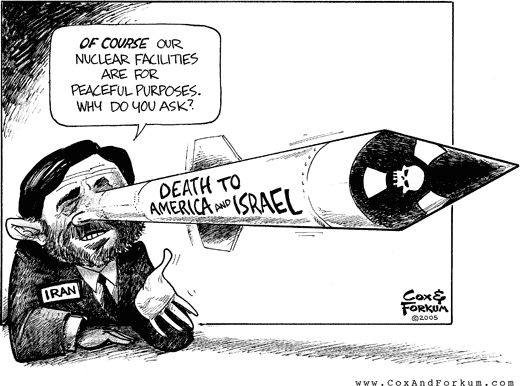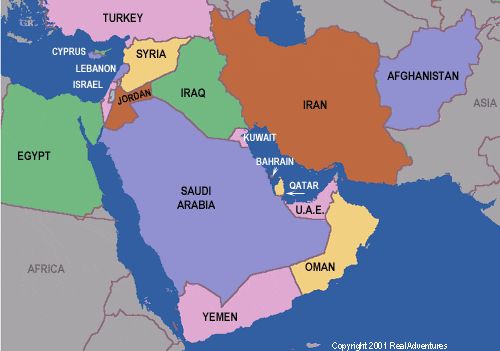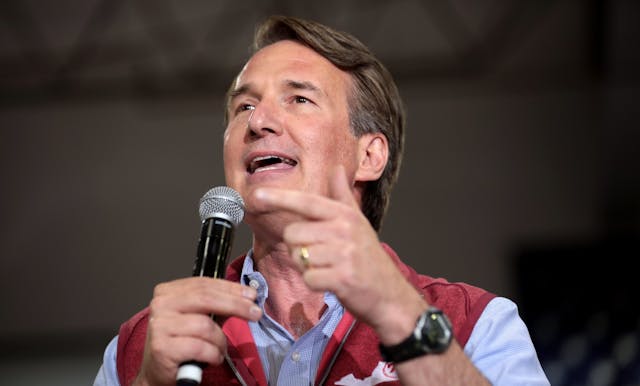Persian Rug

Its the biggest piece of foreign policy this election year, and it's been in the news a lot lately. I'm talking about Iran. And the question comes up... how do we solve a problem like Iran? Despite rescuing sailors, threats to close the Strait of Hormuz, development of nuclear technology, and even the execution of an American citizens that has been convicted of spying... there is no shortage of headlines. The United States, in a nutshell, seems to be caught between a rock and a hard place with no easy answers.
 The main problem is the threat of Iran developing a nuclear weapon. They say that they are working nuclear energy... which if they are, I have no quarrels with. However, I don't think many of us are buying what they are trying to tell us. They have stated, repeatedly, that they would hit Israel, Europe, and the US if they did develop a nuclear weapon. Seems like pretty big talk from a country that knows it would be blown into non-existence by the western industrialized world if it did (with condemnation from the Arab world, as well). Iran has already had sanctions placed on it by the United Nations... though, at best, it's only slowing down the progress of their uranium enrichment and is not (and will not) stop it. With all the latest problems, the US is calling upon the United Nations to place even more sanctions on the country, to which Iran has replied by threatening to close the Strait of Hormuz... which connects to the Persian Gulf. Why is the Strait of Hormuz important? It's where a lot of our oil comes through... and oil for the world, as well. But there is a catch to Iran's "evil" threat. Most of the oil from Iran goes through there, too. If they close it off, how does there oil get out? I'm pretty sure we'd have our own blockade outside of theirs so that their ships don't get out either. It would basically be a showdown reminiscent of the Cold War and the Cuban Missile Crisis. The only difference, only one of us is currently a nuclear power... though we have the knowledge that using a nuclear weapon brings about more harm than good.
The main problem is the threat of Iran developing a nuclear weapon. They say that they are working nuclear energy... which if they are, I have no quarrels with. However, I don't think many of us are buying what they are trying to tell us. They have stated, repeatedly, that they would hit Israel, Europe, and the US if they did develop a nuclear weapon. Seems like pretty big talk from a country that knows it would be blown into non-existence by the western industrialized world if it did (with condemnation from the Arab world, as well). Iran has already had sanctions placed on it by the United Nations... though, at best, it's only slowing down the progress of their uranium enrichment and is not (and will not) stop it. With all the latest problems, the US is calling upon the United Nations to place even more sanctions on the country, to which Iran has replied by threatening to close the Strait of Hormuz... which connects to the Persian Gulf. Why is the Strait of Hormuz important? It's where a lot of our oil comes through... and oil for the world, as well. But there is a catch to Iran's "evil" threat. Most of the oil from Iran goes through there, too. If they close it off, how does there oil get out? I'm pretty sure we'd have our own blockade outside of theirs so that their ships don't get out either. It would basically be a showdown reminiscent of the Cold War and the Cuban Missile Crisis. The only difference, only one of us is currently a nuclear power... though we have the knowledge that using a nuclear weapon brings about more harm than good.
So how did this nuclear problem develop with Iran? Why does it only seem like it's developed in the last few years? It actually stems from something that the United States has done. That's right, we caused our current situation with Iran. And how did we do this? By invading Iraq and removing Saddam Hussein from power. Seem like a big leap? It's really not. Iran and Iraq have been bitter enemies of each other. In the 1980s, they even fought a war against each other. It was always touchy between the two countries and any spark could set them off. After the 1979 revolution in Iran, the US and it's allies propped up and supported Saddam's regime in Iraq to use him as a regional buffer. He just got a little too big for his pants by 1991 when he invaded Kuwait... leading to the first Gulf War. So one must offer the question, if we hadn't gone to war in Iraq in 2003 and Saddam was still in power, would we be facing the current situation with Iran attempting to develop nuclear weapons. Though I can't predict alternate timelines and futures, I would tend to say no. Saddam would never have allowed Iran to even get this far because it would have been a threat against his own regime and hold on power. If necessary, he would have gone to war with them to stop them. With him gone, there is no longer a buffer in the region between Iran's goals and the rest of the world as there once had been.
So since Saddam would have gone to war with Iran to stop it, why shouldn't the US and it's allies do the same... as some Republican Presidential candidates have suggested? Because it would probably do more harm than good. If Saddam had invaded, it would have been one Islamic nation invading another. No big deal overall. If the US and it's allies invaded, it would be seen as invading another Islamic country and being, as yet, more proof that we are against Islam (which we are not). It actually could drive up recruitment for al Qaida and other terrorist organizations... which could come back to get us in the long run. Our own national security could end up being threatened.
So what started Iran down the road of nuclear technology? Only lately has been it become top headlines with the threat of the nation developing nuclear weapons. In terms of the technology for power, that can be traced back to the United States. That's right, it was the US that started giving the Iranian government nuclear technology starting all the way back in 1957 by the Eisenhower administration under the name "Atoms for Peace". This would be continued until the 1979 revolution. In the 1970s, France and Germany would also join the US in sending assistance to Iran's nuclear program.
"After balking initially, President Gerald R. Ford signed a directive in 1976 offering Tehran the chance to buy and operate a U.S.-built reprocessing facility for extracting plutonium from nuclear reactor fuel. The deal was for a complete "nuclear fuel cycle" -- reactors powered by and regenerating fissile materials on a self-sustaining basis." Washington Post (March 26, 2005)
 I bring up the administration of President Ford for a specific reason. There are some names from that administration that are tied to the administration of President George W. Bush when the issue with Iran began to unfold. Richard [Dick] Cheney was the White House Chief of Staff and Donald Rumsfeld was the Secretary of Defense for President Ford. In the Bush administration, they were Vice-President and Secretary of Defense respectively. And while Iran, which was then an ally in the 1970s, had close ties to the US government, it also had ties to US businesses such as Westinghouse and GE. So now we know why the Bush administration didn't want to talk about this issue very much. And we basically created our own problem that we have today. True, we can't predict the future. And in the 1950s, there would have been no way to predict what would have happened in 1979 and here in the 21st century. But I'm pretty sure we should have seen the writing on the wall by the late 1970s... and we should have known what would happen if we removed Saddam from power in Iraq (though he was an evil man and didn't deserve to be in power).
I bring up the administration of President Ford for a specific reason. There are some names from that administration that are tied to the administration of President George W. Bush when the issue with Iran began to unfold. Richard [Dick] Cheney was the White House Chief of Staff and Donald Rumsfeld was the Secretary of Defense for President Ford. In the Bush administration, they were Vice-President and Secretary of Defense respectively. And while Iran, which was then an ally in the 1970s, had close ties to the US government, it also had ties to US businesses such as Westinghouse and GE. So now we know why the Bush administration didn't want to talk about this issue very much. And we basically created our own problem that we have today. True, we can't predict the future. And in the 1950s, there would have been no way to predict what would have happened in 1979 and here in the 21st century. But I'm pretty sure we should have seen the writing on the wall by the late 1970s... and we should have known what would happen if we removed Saddam from power in Iraq (though he was an evil man and didn't deserve to be in power).
So how should the US and the United Nations deal with the situation in Iran now? I think we should call their bluff about closing the Strait of Hormuz if we place more sanctions on them. Place the sanctions and see what they do. For them, closing the waterway might anger their own neighboring countries into taking action. And I also think there would be a huge outcry from the rest of the world (not just the US)... and would end up hurting the Iranian economy more than it would hurt anyone else's. It could actually end up causing a bigger crisis among the people in their own country as we witnessed throughout the Arab world in 2011. The people might revolt and depose of the current regime that has left them isolated in the world.
Though I have doubts sanctions can actually stop Iran from developing nuclear weapons, I do feel like it's the only alternative and suggest that we pursue it. Going to war... in a nation that is already tired of being at war and has a massive debt problem is just not an option. In my opinion, the inevitable is going to happen whether we want it to or not. The best we can do is slow that progress down to a crawl and hope for a regime change that wants to be part of the global community. The problem with Iran is it's now the "big-dog" in the neighborhood. It's buffer to power is gone and the sky is the limit. It just wants to fit in with the other big players of the world... the US, Russia, China, India, Pakistan, Europe, North Korea... that already have nuclear weapons. The problem is that their country is ruled by something along the lines of a "immature, hormonal teenager" who have immediate "knee-jerk" reactions when they don't get their way. Anything is possible, but we must make sure that we are acting in concert with the international community. This is not a path that we must go down on our own. As I said... we are stuck somewhere between a rock and a hard place with this one.
LINKS:
Washington Post -- March 25, 2005
General Information (especially the section on the 1970s)



